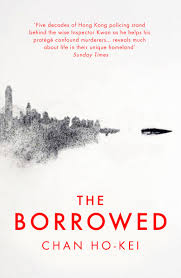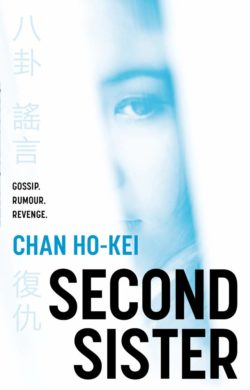September 2020: Chan Ho-Kei 陳浩基 and the Bai Meigui Translation Competition
 This September we're delighted to welcome Chan Ho-Kei as our author of the month for a second time, in a special feature highlighting the winner and runners-up of our 5th Bai Meigui Translation Competition! Chan Ho-Kei was raised in Hong Kong. He won the Mystery Writers of Taiwan Award for his short stories, and in 2011 he won the Soji Shimada Award, the biggest mystery award in the Chinese world. We first featured him in December 2018, with an excerpt from his novel The Borrowed, translated by Jeremy Tiang and published in the UK by Head of Zeus. Since then, his second novel to be translated into English (also by Jeremy Tiang) is Second Sister, has also been released by Head of Zeus.
This September we're delighted to welcome Chan Ho-Kei as our author of the month for a second time, in a special feature highlighting the winner and runners-up of our 5th Bai Meigui Translation Competition! Chan Ho-Kei was raised in Hong Kong. He won the Mystery Writers of Taiwan Award for his short stories, and in 2011 he won the Soji Shimada Award, the biggest mystery award in the Chinese world. We first featured him in December 2018, with an excerpt from his novel The Borrowed, translated by Jeremy Tiang and published in the UK by Head of Zeus. Since then, his second novel to be translated into English (also by Jeremy Tiang) is Second Sister, has also been released by Head of Zeus.
 The Borrowed tells the story of a Hong Kong detective whose career spans fifty years of the territory’s history. Our reviewer Sean Barrs says: The book does wonders at capturing the city, a city that is rich in its own culture. And the culture is varied. There is no unifying sense of identity, but a collection of smaller spaces that are linked to the history of China as whole but together help to create part of the present.
The Borrowed tells the story of a Hong Kong detective whose career spans fifty years of the territory’s history. Our reviewer Sean Barrs says: The book does wonders at capturing the city, a city that is rich in its own culture. And the culture is varied. There is no unifying sense of identity, but a collection of smaller spaces that are linked to the history of China as whole but together help to create part of the present.
 Second Sister tells a tale of cyberbullying and revenge, about a woman on the hunt for the truth about her sister's death; 'a cat and mouse game through the city of Hong Kong and its digital underground.'
Second Sister tells a tale of cyberbullying and revenge, about a woman on the hunt for the truth about her sister's death; 'a cat and mouse game through the city of Hong Kong and its digital underground.'
We're very grateful to Chan Ho-Kei for allowing us to use one of his short stories for our 5th competition text. The competition ran in 2018-19 (you can also find out about this year's competition here), and was judged by an expert panel of award-winning translators, authors and editors, consisting of Jeremy Tiang, Tammy Ho Lai-Ming, and Natasha Bruce. We received entries from all over the world, and are grateful too to our wonderful panel of judges for all their hard work!
The overall winner was Bill Leverett, and you can read his translation here. The original Chinese text, 靈視, can be read here. Bill's translation will also be published in a forthcoming issue of Pathlight magazine, edited by Jeremy Tiang, focusing on genre fiction.
In addition to the winning entry, we're also very happy to be able to publish the two runners-up, Stacy Mosher and Kristen Robinson. Congratulations to all our winners! Here's what the judges had to say:
“The overall quality of the entries was very high, and this was a difficult competition to judge. Chan Ho-Kei’s writing manages to be pithy, elegant, hilarious and startling all at once, and the structure of this story contained a couple of knife-edge turns that had to be skilfully navigated. Fortunately, many of our entrants were up to the task, coming up with translations that impressed and entertained us.
A large number of entries had patches of prize-worthy brilliance, such as wonderfully convincing dialogue and creative English solutions for phrases specific to Hong Kong, but maintaining a constant, believable voice for the first-person narrator often presented a challenge. In some versions, he spoke in regional slang that felt incongruous with the setting, whereas in others he sounded crude on one page yet almost Victorian on the next. By the final paragraphs, however, almost all translators had captured Chan’s pacing and tone, producing an effect that felt just as chilling as the original
In the end, the three entries that stood out for us were those by Bill Leverett, Stacy Mosher and Kristen Robinson [the competition was judged anonymously, with names inserted later!]. We admired the irreverent energy and brio of Robinson’s translation, the accuracy and lively dialogue of Mosher’s, and the fluidity and consistency of Leverett’s. All three of these translators responded to Chan Ho-Kei’s story with sensitivity and creativity, honouring the original while producing a piece that was very much their own. It was a joy to see how different these three renditions were. Ultimately, we could only choose one winner, and we felt the translator who best captured the style and substance of the original, whilst also creating an English-language version that worked on its own terms, was Bill Leverett.”
If you're inspired by this and hope to have a go at a future competition, keep an eye on our website!
